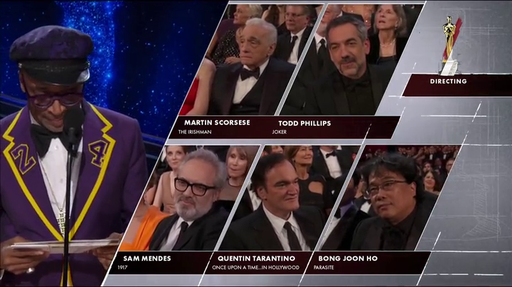A new series by Juan Carlos Ojano moving backwards through time looking at female-helmed films. Here's the full introduction if you missed it.

The biggest story of the 2019 awards season was Parasite breaking the language barrier and becoming the first non-English language film to win Best Picture at the Academy Awards. Another story also gained prominence during that season: despite the considerable number of films directed by women that had awards buzz, none of them were nominated in the Best Director category yet again.
This was disappointing since the eligible films coming from all continents displayed the diversity of the work that women directors produced that year. Out of the 344 films included in the Reminder List of Eligible Films in 2019 (92nd Academy Awards), 78 of them (or 22.7%) were directed/co-directed by women...
OSCAR-NOMINATED FEMALE-DIRECTED FILMS (in alphabetical order):
American Factory, A Beautiful Day in the Neighborhood, Breakthrough, Brotherhood*, Dcera (Daughter)*, The Edge of Democracy, For Sama, Frozen II, Harriet, Honeyland, Kitbull*, Learning to Skateboard in a Warzone (If You’re A Girl)*, Little Women (nominated for Best Picture), A Sister*, Sister*, St. Louis Superman*, and Walk Run Cha-Cha*. (*not in the eligibility list for Best Picture)
AN ALTERNATIVE SET OF FIVE

Mati Diop - Atlantics
A forbidden romance, a ghost story, and social critique. Diop assembles these elements to form a cinematic beast that defies easy verbiage. At once, this film is both unknowable and vulnerable. Scenes are framed with visual panache that refuses to veer into pretense. Even the most enigmatic is rooted in the ordinary. Its subversion becomes more haunting as it explores the narrative’s trickier undercurrents. Images from this film register on different levels, ones that show how multi-faceted this seemingly simple story is. On the other hand, its sound design envelopes the narrative further into the mysticism that feels singularly ethereal. This is cinema that dares to do a dance of evocative imagery and absorbing soundscape. Streaming on Netflix.

Lulu Wang - The Farewell
The clash of the East/West is at the heart of this moving family drama. Wang displays cultural specificity in telling this story through its various layers. The cultural difference itself is quite striking, but she goes deeper as she mines how it trickles down into the relationships of the characters. Through deliberate framing - either symmetrical or off-center - we see how our protagonist Billi negotiates her space in a place that both feels homey and foreign. But perhaps one success of Wang’s filmmaking that resonates loudly is making sure the film goes beyond the fish out of water trope. The film allots time to humanize even the secondary characters. This makes the film’s handling of its central theme even stronger. Streaming on Prime Video and Kanopy.

Greta Gerwig - Little Women
How does cinema recreate human emotion so genuinely? In this Best Picture nominee, Gerwig brings her own take on this literary classic with such life that every emotional beat feels tangible and grounded. So much of the film’s emotional impact is in making sure that we are in synchronicity with the characters’ emotional state. Gerwig stages group scenes with a perfectly measured rhythm, turning these moments into a crackling ricochet of dialogue or a poignant moment of silence. This strategy comes into play as the film situates itself firmly in domesticity. Gerwig’s refusal to turn this facet of her story as insignificant speaks loudly to her commitment to capturing human moments with clear-eyed honesty. That is no easy task. Streaming on Starz and DirecTV.

Jennifer Kent - The Nightingale
Depicting abuse in film could easily go wrong. To sanitize it is to minimize its impact, to sensationalize it is to perpetuate it even more. Kent faces this challenge head-on. Sexual abuse is at the film’s center, with at least three scenes that depict them with unflinching brutality but without the lascivious gaze. Instead, we see these moments in fragments; medium shots and close ups capture the harrowing ordeal. The focus is on recreating the chaotic headspace: what does one see, hear, and feel. Moreover, the film goes beyond that by also exploring the rampant abuse experienced by the Aborigines. Kent displays the understanding that the central story is situated in a much wider system of abuse. Streaming on Netflix, Hulu, AMC+, and DirecTV.

Celine Sciamma - Portrait of a Lady on Fire
French auteur Sciamma goes back to the eighteenth century to tell the story of a complicated relationship between the artist and her subject. Desire is the driving force in this film, but what Sciamma crafts expertly is witnessing the unpredictable path towards its realization. Precise blocking, pacing, and framing give us a lot of information about the shifting dynamics within their relationship. But more importantly, the film reconfigures how we experience it. Instead of a musical score, the film employs crashing waves, silence, and diegetic music. Instead of shot-reaction shots, we stay in extended takes. These choices add up to a palpable whirlwind, one that heightens our senses and makes us more perceptive. Streaming on Hulu and Kanopy.
HONORABLE MENTIONS
Marielle Heller - A Beautiful Day in the Neighborhood
Petra Costa - The Edge of Democracy
Tamara Kotevska & Ljubomir Stefanov - Honeyland
Lorene Scafaria - Hustlers
Lauren Greenfield - The Kingmaker